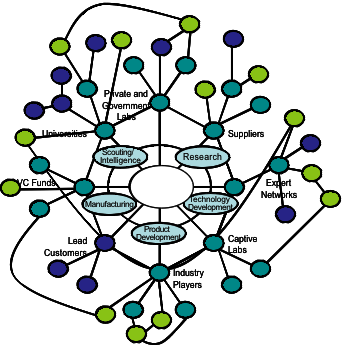How Are Expert Networks Relevant In The Healthcare Industry?
Have you ever wondered how expert networks play a crucial role in the healthcare industry? 🤔 Well, let’s dive in and explore the relevance of expert networks in this fascinating field. 🌟
When it comes to healthcare, staying up to date with the latest advancements and best practices is essential. That’s where expert networks come into play, connecting professionals in the healthcare industry with knowledgeable experts. 🤝
By tapping into expert networks, healthcare practitioners can access a wealth of specialized knowledge, insights, and guidance. These networks bring together experts from various domains, allowing healthcare professionals to seek advice, collaborate, and make well-informed decisions. 💡

How are Expert Networks Relevant in the Healthcare Industry?
In today’s rapidly evolving healthcare industry, the need for expertise and knowledge is critical. Healthcare professionals, researchers, and decision-makers must stay updated with the latest information and insights to make informed decisions. This is where expert networks come into play. Expert networks are platforms that connect professionals across various industries and allow them to share their knowledge, experiences, and expertise. In the healthcare industry, expert networks are becoming increasingly relevant as they provide access to a wide range of healthcare experts and facilitate collaboration, knowledge-sharing, and innovation. In this article, we will explore how expert networks are revolutionizing the healthcare industry and why they are crucial in today’s healthcare landscape.
The Advantages of Expert Networks in the Healthcare Industry
Expert networks offer numerous benefits to the healthcare industry, making them a valuable resource for professionals and organizations. Let’s take a closer look at some of the advantages:
1. Access to Specialized Expertise
In the complex and ever-changing field of healthcare, it is crucial to have access to specialized expertise. Expert networks connect professionals from various disciplines and allow them to share their knowledge and insights. This opens up opportunities for healthcare professionals to collaborate with experts in specific areas, such as medical research, telehealth, or healthcare policy. By tapping into the collective expertise of these networks, healthcare professionals can gain access to specialized knowledge that can inform their decision-making and improve patient outcomes.
Additionally, expert networks enable professionals to connect with thought leaders and industry influencers who have extensive experience and deep understanding of the healthcare landscape. By engaging with these experts, healthcare professionals can expand their knowledge and stay updated with the latest trends and advancements in the industry.
Overall, expert networks provide a platform for healthcare professionals to tap into a vast pool of specialized expertise, enhancing their decision-making capabilities and driving innovation in the healthcare industry.
2. Collaborative Problem-Solving and Knowledge-Sharing
The healthcare industry is faced with complex challenges that require collaborative problem-solving and knowledge-sharing. Expert networks offer a platform for professionals to come together, exchange ideas, and find innovative solutions to these challenges.
…
Key Takeaways: How are expert networks relevant in the healthcare industry?
- Expert networks connect healthcare professionals with access to specialized knowledge and insights.
- These networks provide opportunities for collaboration, mentoring, and knowledge sharing.
- By connecting experts from different fields, expert networks promote interdisciplinary approaches to healthcare challenges.
- Expert networks enable healthcare providers to stay updated on the latest research and advancements in their field.
- Membership in expert networks can enhance professional development and career growth in the healthcare industry.
Frequently Asked Questions
Wondering how expert networks play a role in the healthcare industry? We’ve got you covered! Here are some commonly asked questions:
1. How do expert networks benefit healthcare professionals?
Expert networks provide healthcare professionals with access to a diverse range of specialists and experts in various fields within the healthcare industry. These networks help professionals connect with subject matter experts who can offer specialized knowledge, insights, and guidance. By tapping into the expertise of these networks, healthcare professionals can make more informed decisions, improve patient care, and stay up to date with the latest developments in their respective areas of practice.
Moreover, expert networks can assist healthcare professionals in navigating complex medical cases, conducting research, and finding innovative solutions to challenges they may encounter in their work. Whether it’s seeking advice from leading physicians, consulting researchers, or discussing emerging trends with fellow experts, expert networks provide an invaluable resource for healthcare professionals.
2. How do expert networks benefit healthcare organizations?
Expert networks offer healthcare organizations access to a vast pool of specialized professionals and industry experts. These networks allow organizations to tap into the knowledge and experience of these experts, enabling them to make more informed decisions in areas such as research, strategic planning, and policy development.
By leveraging expert networks, healthcare organizations can also enhance their ability to address complex challenges and find innovative solutions. For example, an organization may consult with experts in healthcare technology to optimize their IT systems, or seek guidance from healthcare economics experts to develop sustainable financial strategies. These networks help organizations stay ahead of industry advancements, foster collaborations, and ultimately improve patient outcomes.
3. How do expert networks facilitate knowledge sharing in the healthcare industry?
Expert networks play a vital role in fostering knowledge sharing within the healthcare industry. They provide a platform for experts to share their insights, experiences, and expertise with other professionals in the field. By participating in expert networks, healthcare professionals can engage in discussions, contribute to research studies, and exchange best practices.
These networks also enable healthcare professionals to stay updated on the latest advancements, emerging trends, and research findings. Through webinars, conference calls, and online forums, experts can share their knowledge and insights, creating a collaborative environment that promotes continuous learning and professional growth in the healthcare industry.
4. How do expert networks impact healthcare decision-making?
Expert networks have a significant impact on healthcare decision-making by providing access to specialized knowledge and insights. When faced with complex medical cases or challenging decisions, healthcare professionals can consult experts through these networks to receive guidance and assistance.
Expert networks help professionals make evidence-based decisions by providing them with access to the latest research, medical guidelines, and best practices. By leveraging the expertise available through these networks, healthcare professionals can make well-informed choices that are aligned with the latest advancements and industry standards, ultimately leading to improved patient outcomes and more effective healthcare delivery.
5. How do expert networks support healthcare innovation?
Expert networks play a crucial role in supporting healthcare innovation by connecting professionals with individuals who have unique expertise and perspectives. Whether it’s consulting with experts in medical technology, healthcare research, or regulatory affairs, these networks enable professionals to explore new ideas, collaborate on research projects, and discover innovative approaches to healthcare challenges.
By fostering collaboration and knowledge exchange, expert networks create an environment conducive to exploring novel solutions to complex healthcare problems. This not only drives innovation but also helps healthcare professionals and organizations adapt to an ever-evolving industry, paving the way for advancements in patient care, treatments, and healthcare delivery.
Summary
So, to sum it all up, expert networks are pretty important in the healthcare industry. They help connect healthcare professionals and provide valuable insights to improve patient care. These networks offer access to specialized knowledge and help make informed decisions. It’s like having a big team of experts working together to make healthcare better for everyone. So, next time you hear about expert networks, remember how they’re making a difference in healthcare.


